 Tamale, Ghana – A research commissioned by EIB Network and conducted by Hope for Future Generations (HFFG) has revealed that majority of People with Disabilities (PWDs) in the Northern region face serious challenges in relation to access to entrepreneurial, economic and livelihood opportunities.
Tamale, Ghana – A research commissioned by EIB Network and conducted by Hope for Future Generations (HFFG) has revealed that majority of People with Disabilities (PWDs) in the Northern region face serious challenges in relation to access to entrepreneurial, economic and livelihood opportunities.
This, according to the research, makes it difficult for them to save since their monthly expenses are much more than their income. The research which focused on the Savelugu and Yendi districts in the region revealed that most of the participants are skilled but they need adequate funds to operate.
‘’Out of participants who receive monthly income, 60.5%, representing 23 females, have incomes that are between GH$100 to GH$ 500,’’ the report disclosed.
It stated that PWDs find it difficult to get access to entrepreneurial services in these two districts, stating, ‘’the challenge, however, is that, these services are difficult to access and also do not have.’’
From the research “57.9% of the participants indicated that it is quite difficult to access these services even though some of them (Soap making, Beads making, Tailoring and others) exist.
‘’Social and entrepreneurial services are difficult to find in these districts and even if one finds them, the funds needed to startup is a challenge,’’ the research stated.
The research, which was commissioned in line with the ‘Starr Woman Project’ with special focus on the Dream Edition targeting disabled women entrepreneurs, disclosed that, ‘’Aside entrepreneurial jobs, it is difficult to search for jobs. The few participants who have tried to access jobs always find it difficult to get because they are not treated equally.’’
According to the research, majority of PWDs in the Northern Region would have been able to engage in business opportunities but are faced with financial challenges to start up their business.
District Assembly Common Fund
The research indicated that majority of PWDs in the two districts were not aware of the funds allocated to them in the District Assembly Common Fund. The district assembly has 3% component of the Common Fund to support PWDs start up or establish small-scale business in the various districts.
However, the research indicated that, ‘’Both districts narrated that it is difficult to even know the amount that is available to them in terms of the fund.’’
The research further indicated that, ‘’Most respondents also indicated that the amount that is given at the end of the day is too small to even start up a business. Respondents indicated that it ranges between 200-500 Ghana Cedis.”
‘’Majority of the respondents (63.2%) have some form of knowledge in relation to the District Assembly Common Fund with 36.8%, representing 14 respondents who do not know of the Common Fund.
‘’However, 42.1% (16) have ever accessed the funds while 55.3% (21) have never accessed it. Out of the respondents who have accessed it, just a few have been able to get access to the cash,’’ it was disclosed in the study.
Access to Water and Sanitation
The research revealed that PWDs face challenge in accessing water in the two districts in the Northern Region.
They revealed that since the PWDs are weak, they usually depend on their neighbors and family members.
‘’Toilet facilities are not accessible and most of PWDs do not have such facilities in their homes, which becomes a challenge. The physically challenged and visually impaired are not able to access these facilities because of the way they are developed.
‘’The visually impaired always have to move with assistance to different locations to access this service which is a challenge because you are likely not to find assistance at certain times of the night,’’ the report mentioned.
Source: Starrfmonline.com
 Savannah News Online Reporting Only What Matters Most
Savannah News Online Reporting Only What Matters Most



